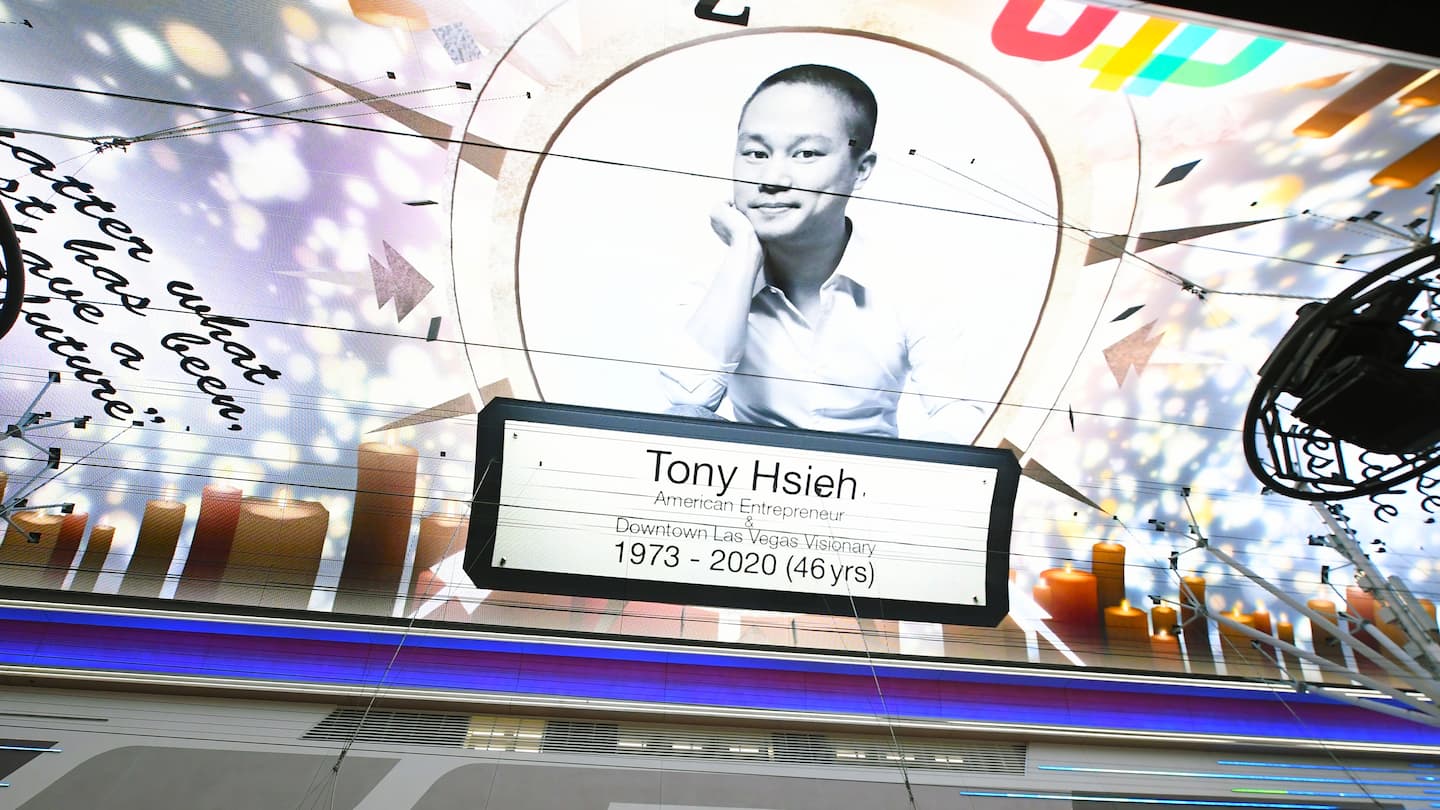The man who tried to bring us together, shoe by shoe

Hsieh perished at age 46 following a fire in the Connecticut home where he was staying over the Thanksgiving holiday. He was trapped in an attached shed, where he may have been using a heater to lower both the oxygen level of the structure and, as a biological stress test, his brain. The coroner ruled his demise an accident, reportedly preceded by months of alcohol and drug abuse and other behavior that prompted him in his last days to plan to enter rehab. This was a tragic end for a man who never shied from spectacle, or from extremes. Whatever it took, he thought, to deliver happiness.
“Delivering Happiness: A Path to Profits, Passion, and Purpose” was the title of Hsieh’s 2013 autobiography, though the profits at times seemed a byproduct of the passion and purpose. As two recent stories in Forbes and the Wall Street Journal reveal, the son of Taiwanese immigrants was restless, needing constantly to invent. Yet what he was inventing was more than a company, and more than the deep obsession with customer satisfaction his parent company now considers its trademark. He was inventing communities — until he couldn’t anymore.
Technology executives are known to relentlessly alter their products toward perfection. Every tweak is treated as an opportunity to A/B-test the way to a solution for whatever problem a company is purportedly founded to solve. For Hsieh, that problem wasn’t so much getting more shoes to more people with less hassle as it was getting more shoes to more people and expecting them to enjoy it all. His invention wasn’t shipping footwear sight unseen; it was shipping it free. And it was promising to accept returns no questions asked — telling buyers he trusted them so that they would trust him, too.
You wouldn’t think you’d develop a sense of connection to your faraway e-retailer, but connection was what Hsieh was after. He didn’t confine this pursuit to his product but rather extended it to his company itself. Bureaucracy was his bete noir. Boundaries were to be breached. Hsieh wasn’t interested in titles (engineer) but in nicknames (fungineer, or “zookeeper”), not in hierarchy but in “holacracy.” This last experiment in management, or rather non-management, resulted in 18 percent of employees taking a hefty buyout. Not everyone wants to report to someone, but not everyone wants to report to no one, either.
Eventually, upon Amazon’s purchase, Zappos became an autonomous company within a company. (Amazon chief executive Jeff Bezos owns The Post.) This was fitting: Outside work, Hsieh had dedicated himself to forming a city within a city as he revitalized downtown Las Vegas to the tune of $350 million. There were tiny homes and trailers, artists and entrepreneurs, all performing, partying and installing themselves on a semi-permanent basis in the newest community Hsieh had created. The visionary turned an Airstream into his domicile.
Hsieh loved the annual Burning Man festival, it seems, for the same reason: You built something whose components weren’t only the materials but also the builders themselves — their souls and their spirits infused into the fruits of their labors, just as Hsieh had infused his product, his company and his revitalized downtown with his own energy and essence.
Hsieh probably intended a repeat performance in Park City, Utah, but the pandemic closed the curtain. He purchased nine properties in the ski town starting in the spring, which is when his old habits took a new and concerning turn. There was the drinking, as ever, but there were mushrooms and ecstasy, too, and, most notably, there was nitrous oxide inhaled ad nauseam. Hsieh tended toward loneliness, his friends have said, and in a world of isolation, he was plain old lonely.
Hsieh had forever attempted to hack his way to happiness through community-crafting in his own image. But community, today, means viral transmission — so suddenly there was only him. Hsieh started to try to hack himself, seeking to reprogram his body with limited sleep, or lack of urination, or barefoot tromps through the snow, or fasts in which the only permissible foods began every day with the next letter of the alphabet. The nitrous oxide was part of this diet of deprivation; it induces hypoxia, as did that purported heater in the garage. None of it solved that same old problem.
This is a story that is unfamiliar and familiar all at once: A multimillionaire eccentric made his name for being like no one else, yet his life revolved around the importance of being with as many someone elses as you can bring into your fold. Tony Hsieh reminds us of how difficult delivering happiness can be when the destination is ourselves — especially today, when we are farther from each other than ever before.
Read more:






